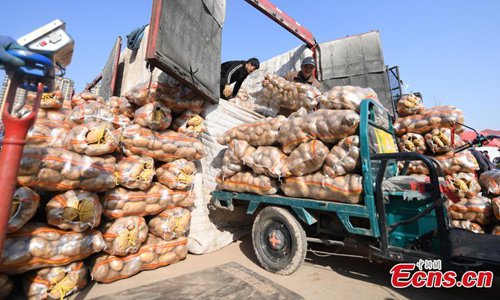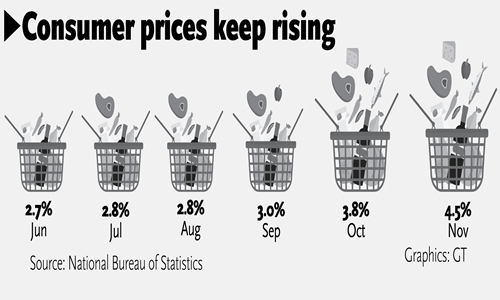HOME >> SOURCE
China’s Nov CPI hits almost 8-year high
By Xie Jun and Song Lin Source:Global Times Published: 2019/12/10 18:53:42
Inflation set to slow next year as pork prices correct

A vegetable wholesale market in Taiyuan City, North China's Shanxi Province, Oct. 30, 2019. As temperatures drop in northern China, sales of vegetables saved for winter use, such as Chinese cabbage, potatoes and green Chinese onion, are rising. (Photo: China News Service/Wu Junjie)

Graphics: GT
Soaring pork prices pushed China's inflation level to a 94-month high in November, according to official data released on Tuesday. But experts said inflation will rise more slowly in 2020 as trade friction eases and pork prices correct.
China's consumer price index (CPI), a main gauge of inflation, rose 4.5 percent year-on-year in November, according to the National Bureau of Statistics (NBS).
The November reading was 0.7 percentage points up from October and the highest since January 2012.
Food prices grew 19.1 percent year-on-year in November, compared with 15.5 percent in October, while non-food prices gained 1 percent, 0.1 percentage points higher than in October.
Soaring pork prices continue to be a main driver of the CPI. In November, pork prices rose 110.2 percent year-on-year, contributing 2.64 percentage points of the overall CPI growth, the NBS data showed.
Prices of livestock meat rose by 74.5 percent in November. Vegetable prices rose by 3.9 percent while fruit prices slumped by 6.8 percent.
Affected by African swine fever and cyclical factors, pork prices have surged in China during the past months. But with production being gradually restored, pork prices have started to fall recently.
"Soaring pork prices have probably peaked. As pork prices fall, the CPI rise will also slow, presumably after the second quarter in 2020," Tian Yun, a vice director of the Beijing Economic Operation Association, told the Global Times on Tuesday.
China is seeking to increase pork investment. Liu Yonghao, chairman of agribusiness company New Hope Group, recently said that the company would invest 9 billion yuan ($1.28 billion) to build new pig farms.
"China is strong in terms of supply, including pork. I presume that meat prices will drop very fast next year with import thresholds being lifted and more frozen meat being sold from inventories," Tian said.
The ongoing trade war between China and the US, which has pushed up prices for a number of agricultural products, also increased China's inflation level, said Li Chunding, a professor at China Agricultural University.
"But I don't think it indicates serious inflation or that China's economy is overheating. The high CPI reading won't last as trade friction eases and pork prices correct," Li told the Global Times.
November's producer price index (PPI), which measures the cost of goods at the factory gate, sank by 1.4 percent on a yearly basis in November, compared with a 1.6-percent drop in October.
Liu Xuezhi, a senior economist at the Bank of Communications, said that the pressure of industrial deflation has emerged, given that the PPI has been falling since July. But the PPI might stabilize and rebound in the second half of 2020 as more government stimulus policies kick in.
Posted in: ECONOMY